What's the Difference Must vs. Have to, Must Not vs. Don't Have to

English Grammar Must and Have to, Mustn't and Don't Have to ESLBUZZ
Updated on October 26, 2020 "Must," "have to," and "need to" in the positive or question form are used to speak about responsibilities, obligations and important actions. I'm having some trouble understanding this. I must ask Peter a few questions. She has to work with clients from all over the world.
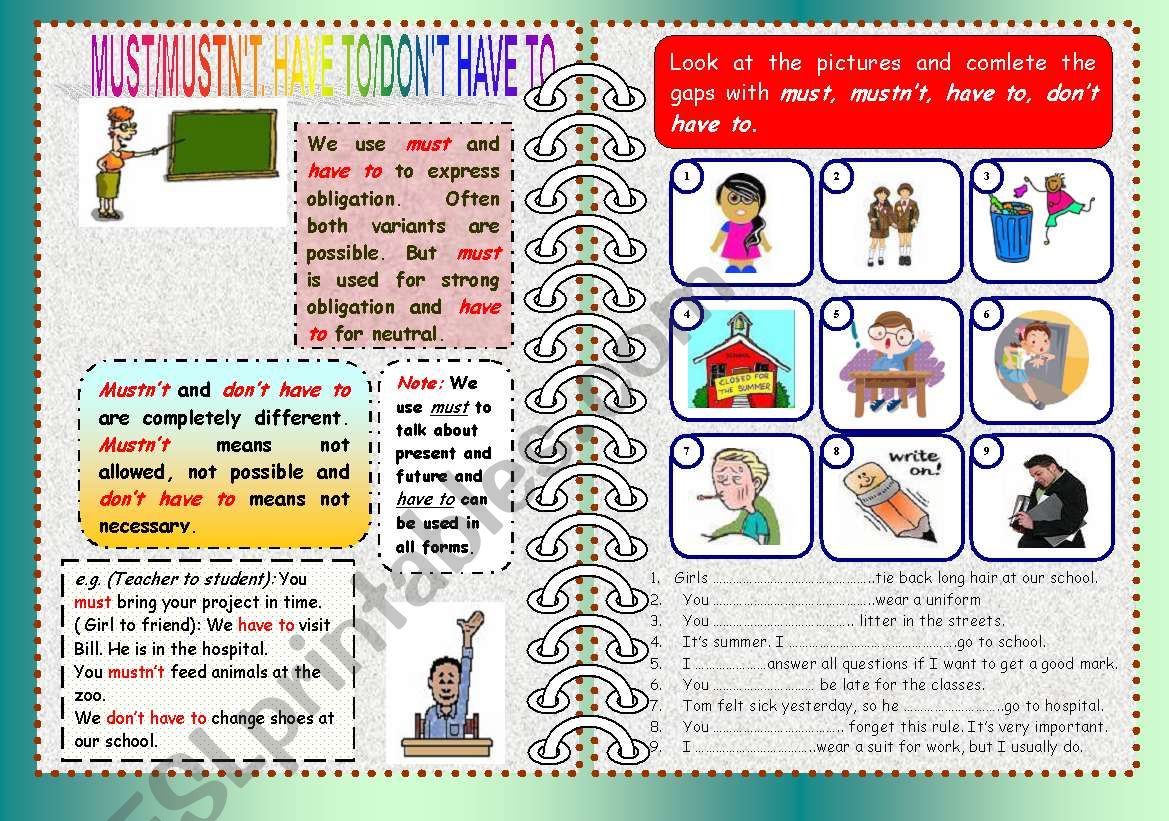
MUST/MUSTN´T, HAVE TO/DON´T HAVE TO ESL worksheet by ptienchiks
Note: "have to" and "must" have the same meaning, but "don't have to" and "must not" are different. "Don't have to" means not necessary, "must not" means forbidden. Complete the sentences below with the words in the box. Remember that "he", "she", and "it" go with "has to" and "doesn't have to." have to don't have to has to doesn't have to must not
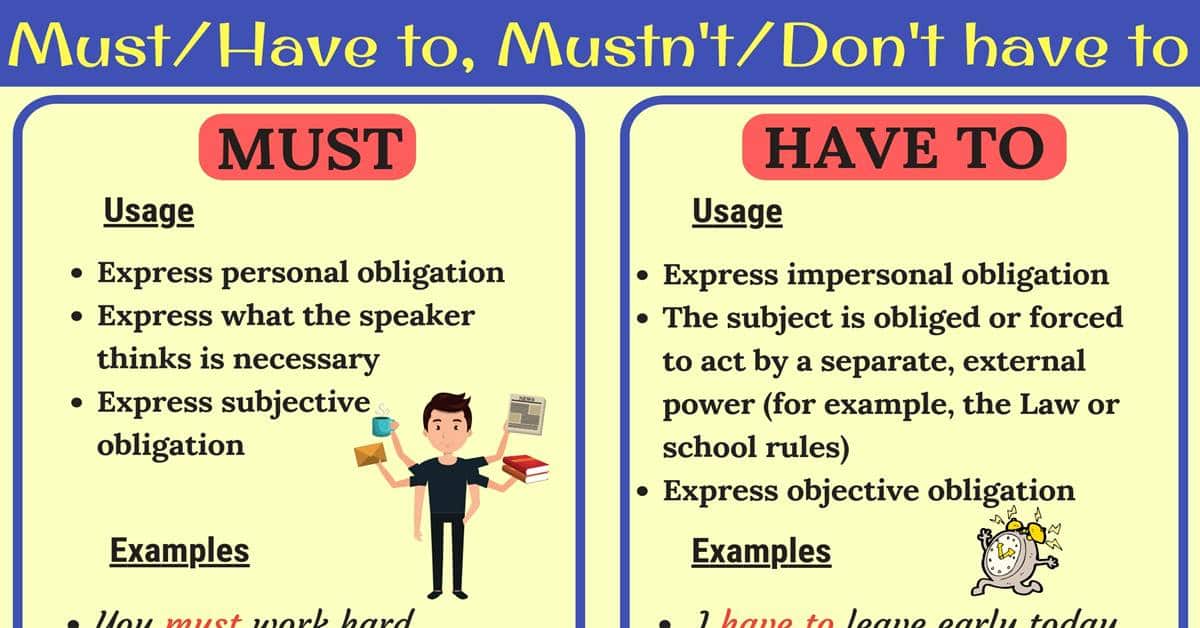
Must vs. Have to Must Not vs. Don't Have to • 7ESL
Must vs Have to / Has to Exercises 1 - 9-10Must / Have to Exercise 2 / 3 11. Must / Mustn't / Needn't / Have to 12-13. Modals With Passive Voice 1 / 2 14. Mustn't vs Needn't vs Can't Similar Exercises: MODALS + V3 Practice Test Ought to (Should) Have / Must Have Needn't Have / Didn't Have To Should Have Done Drag and Drop Exercises: Modals Drag.
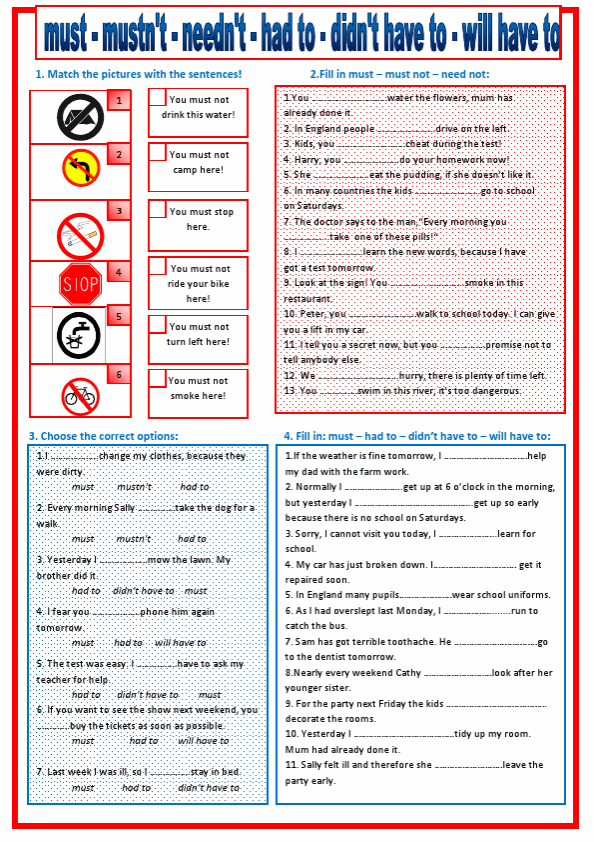
Must Have To Exercises, Free Printable Must Have To ESL Worksheets
Today teacher Mark will explain in an easy way how to use: Have to / Don't have to / Must / Mustn't_____00:00 - Introduction 00:28 - Must and have.
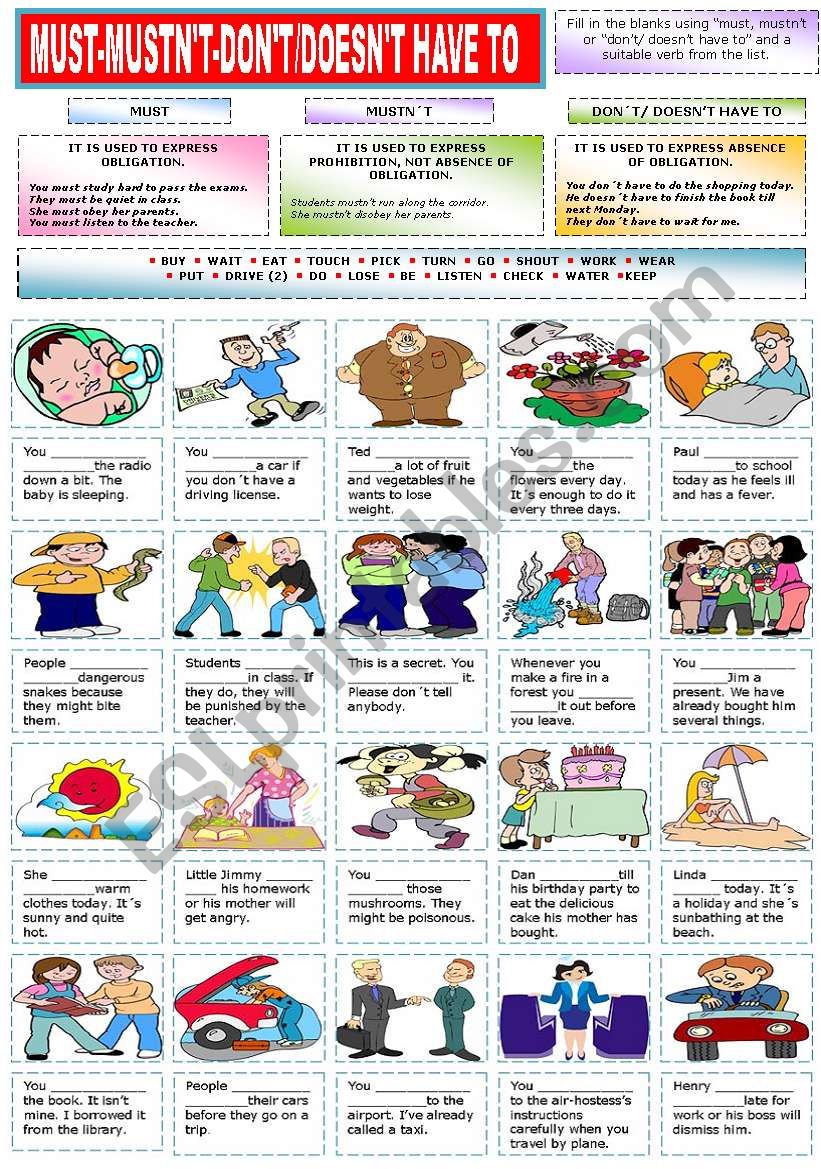
MUSTMUSTN´T DON´T/DOESN´T HAVE TO ESL worksheet by Katiana
Mustn't means something is prohibited or it is not allowed. It is important that you do NOT do something Don't have to means there is NO obligation to do something. You are not required to do something, especially if you don't want to. You can do the thing if you want to. Let's compare the two together where it will make a lot more sense.
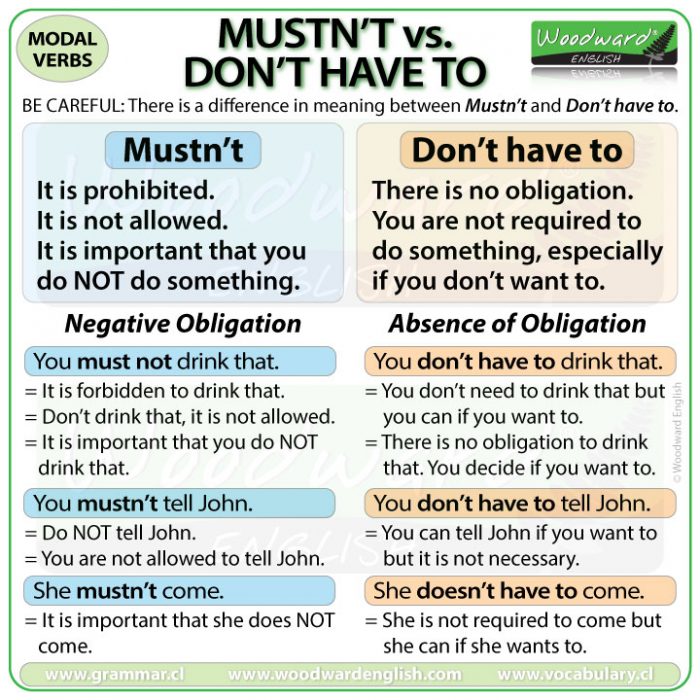
Mustn’t vs. Don’t Have To Woodward English
We're supposed to sacrifice for others halfway across the world by force, and if you complain about someone robbing you of your freedom of movement, you're somehow the bad guy?

Modal verbs must, mustn't should, shouldn't, don't have to
Must: We use "must" when we talk about a requirement or necessity that comes from the speaker or writer themselves. It is a modal verb, carrying a strong sense of personal determination or obligation within a specific context. Have to: In contrast, "have to" is used when the obligation comes from an external source, like laws, rules, or.
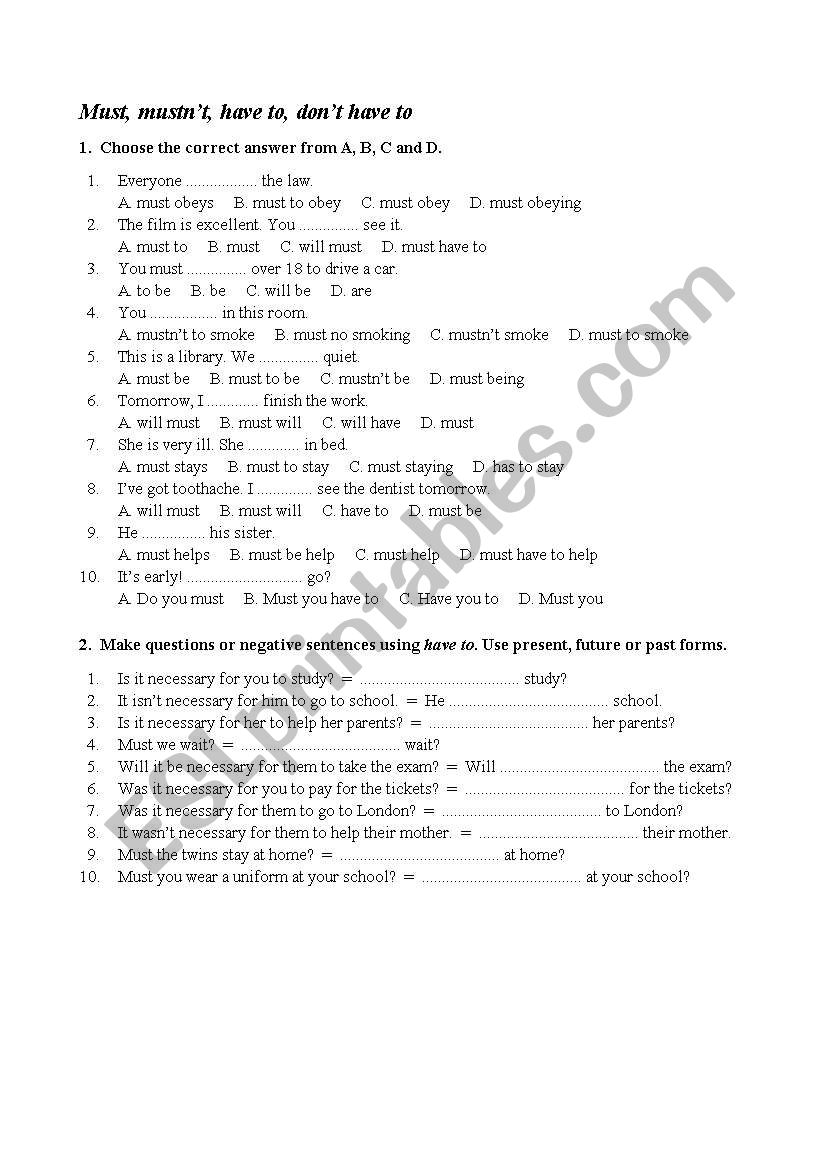
Must, mustn’t, have to, don’t have to ESL worksheet by rudiwals
a) have to not b) must c) mustn't. 5. If you are under 13 you _____ to get your parents' permission.
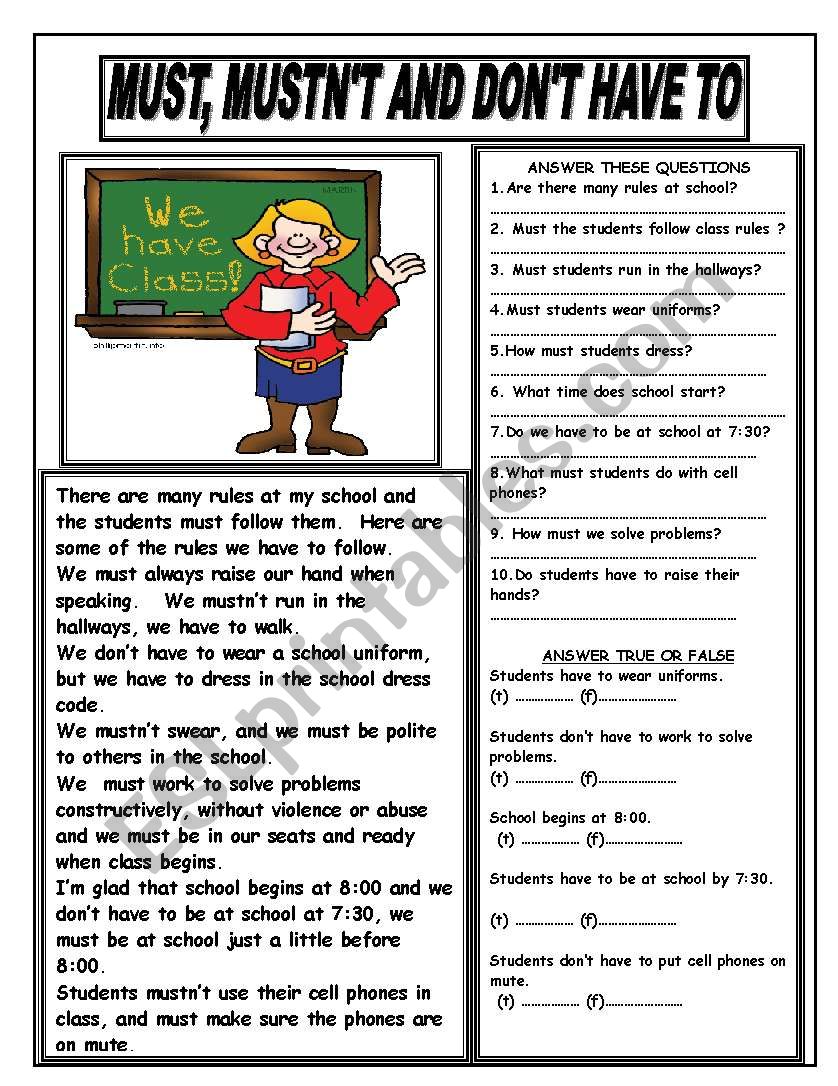
MUST, MUSTN´T AND DON´T HAVE TO ESL worksheet by GIOVANNI
Must and Have to, Mustn't and Don't have to. Learn the differences between these Modal Verbs in English: Must vs. Have to, and Mustn't vs. Don't Have to Must and Have to, Mustn't and Don't Have to 1. We use must when the speaker thinks it is necessary or important to do an action: You must go. (= It is important that you go.)

What's the Difference Must vs. Have to, Must Not vs. Don't Have to
Mustn't / don't have to Exercises: modal verbs 01.- You speak Spanish to travel. 02.- Children chat in class. 03.- I study this weekend. 04.-You be late for school. 05.- You smoke in the car. 06.- You be young to dance. 07.- You be sixteen to ride a bike. 08.- People step on the flowers. 09.- You talk with your mouth full. 10.-

Have to, don't have to, must, mustn't TestEnglish
must vs have to / mustn't vs don't have to - meaning have to Rules and obligations must Rules and obligations don't have to Don't need to - not necessary mustn't Prohibition must vs have to must Obligation from the speaker have to External obligation mustn't vs don't have to don't have to You don't need to do it; not necessary; no obligation

Mustn't and Don't have to English ESL worksheets pdf & doc
English Result Pre-intermediate have to, don't have to, must, mustn't (1) Grammar. Study documents.
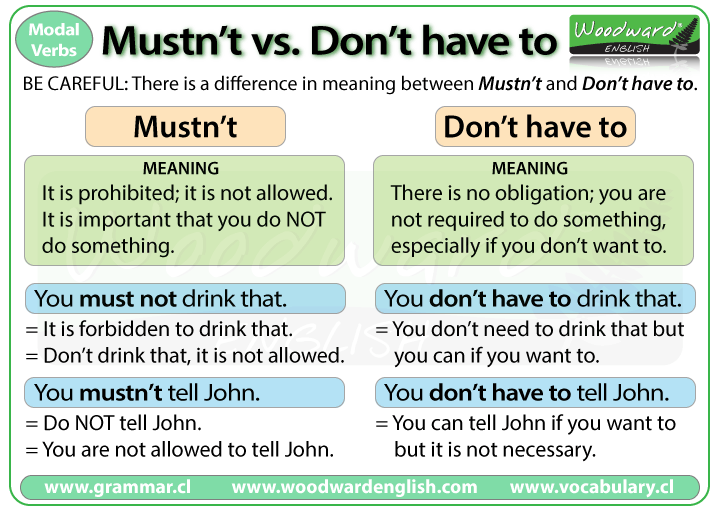
Must English Grammar
by Mcaduislp Verb to have Quiz by Aleguimaccaa Must/mustn't/don't have to Quiz by Mypvccclassroom number 1 to 10 Quiz by Salassusan 4 to 6 Math HAVE YOU EVER.? WHEN DID YOU LAST.? Open the box by Linosa ESL HAVE YOU EVER.

MUST MUSTN'T HAVE TO DON'T HAVE TO Learn english, English
Grammar explanation We often use verbs with modal meanings to talk about permission and obligation. Permission can We often use can to ask for and give permission. Can I sit here? You can use my car if you like. Can I make a suggestion? could We also use could to ask for permission (but not to give it). Could is more formal and polite than can.

MUST MUSTN´T 1 TRAFFIC RULES POSTER (editable) ESL worksheet by
Can / Can't Subject Exercises: 1. Modals Exercises 2. Can vs Be Able To With Tenses 3. Can vs Could Exercise 4. Can Can't Exercises 5-6-7 Mustn't vs Don't Have to Exercises 1 / 2 / 3 8. Must vs Have to / Has to Exercises 1 - 9-10Must / Have to Exercise 2 / 3 11. Must / Mustn't / Needn't / Have to 12-13. Modals With Passive Voice 1 / 2 14. Mustn.

MUST MUSTN'T HAVE TO DON'T HAVE TO English grammar worksheets
You mustn't arrive late. not You mustn't to arrive late. Use of must not. Must not expresses prohibition - something that is not permitted, not allowed. The prohibition can be subjective (the speaker's opinion) or objective (a real law or rule). Look at these examples: I mustn't eat so much sugar. (subjective) You mustn't watch so much.